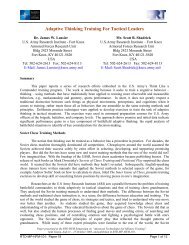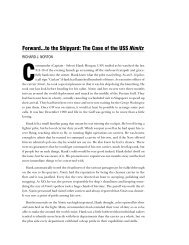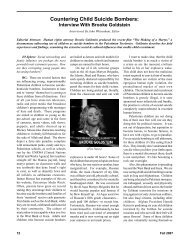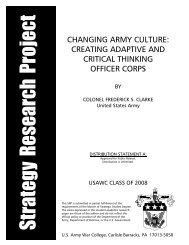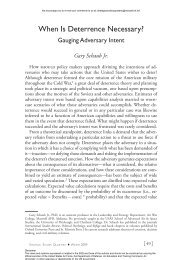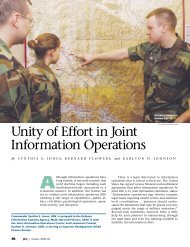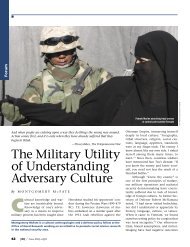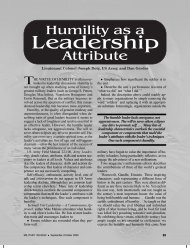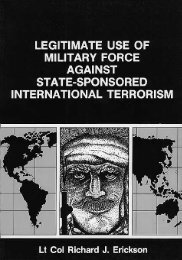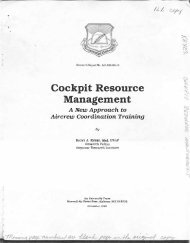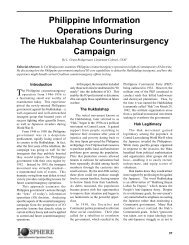Socioeconomic Roots of Middle East Radicalism
Socioeconomic Roots of Middle East Radicalism
Socioeconomic Roots of Middle East Radicalism
You also want an ePaper? Increase the reach of your titles
YUMPU automatically turns print PDFs into web optimized ePapers that Google loves.
RICHARDS 33<br />
inability to provide housing, sewerage, potable water, and garbage collection<br />
raises doubts about its fundamental purpose. Second, the process <strong>of</strong> migration<br />
to the cities is always disorienting. Whether in Ayacucho or Asyut, the mixture<br />
<strong>of</strong> rural-urban migration with discontented provincial intellectuals proves to be<br />
highly toxic (if not yet fatal) to existing governments. The newly arrived migrants<br />
provide fertile fishing ground for Islamic militants, particularly when the<br />
migrant cannot find work and the (allegedly) decadent mores <strong>of</strong> the cities shock<br />
his sensibilities.<br />
Consider Karachi, Pakistan. This city has grown from a population <strong>of</strong> one<br />
million at the time <strong>of</strong> the nation’s independence to eleven million today, and it<br />
may grow to twenty million by 2015. Its managers are overwhelmed, as are its<br />
systems that provide water, electricity, transportation, health care, and education.<br />
In the slums, there is only one place that is cool when outside it is hot, clean<br />
when outside it is filthy, and calm when outside there is chaos—the mosque.<br />
Government policy has played an important (if negative) role here. Government<br />
incapacity and the resulting “abandonment <strong>of</strong> public space” to private Islamic<br />
schools, clinics, hospitals, and welfare agencies have done much to advance the<br />
fanatics’ cause.<br />
Some may object that (as far as one can tell) most <strong>of</strong> those responsible for the<br />
crimes <strong>of</strong> 11 September were privileged and educated. This, however, is entirely<br />
to be expected. George Orwell once quipped that “revolutionaries can always<br />
pronounce their aitches.” Revolutionaries are <strong>of</strong>ten, even typically, from relatively<br />
privileged backgrounds. Lenin was no muzhik, and Mao Tse-tung was the<br />
son <strong>of</strong> a rich peasant; yet the political and economic conditions <strong>of</strong> Russia and<br />
China when they were young pr<strong>of</strong>oundly shaped their opinions and ideals. People<br />
who knew Mohammed Atta (one <strong>of</strong> the 11 September hijackers) in Germany<br />
heard him speak <strong>of</strong> the “fat cats” running Egypt. It is no surprise that the “shock<br />
troops” <strong>of</strong> a revolutionary movement are educated and privileged. It would be<br />
quite ahistorical, however, to argue that their existence—or their appeal—is independent<br />
<strong>of</strong> the social conditions <strong>of</strong> their societies. Monocausal explanations<br />
<strong>of</strong> complex historical phenomena are always foolish.<br />
It is also worth remembering that radicalism reaches far wider than al-Qa‘ida.<br />
Movements in Algeria, Egypt, Palestine, Pakistan, Yemen, Central Asia, and<br />
Southeast Asia include many diverse actors.<br />
A HISTORICAL ANALOGY<br />
The fanatics <strong>of</strong> al-Qa‘ida display a close resemblance to the nihilists and other<br />
terror-prone, would-be revolutionaries <strong>of</strong> nineteenth-century Russia, as<br />
described by the Hungarian writer Tibor Szamuely: “The Russian intelligentsia<br />
was a social stratum composed <strong>of</strong> those politically aroused, vociferous, and



